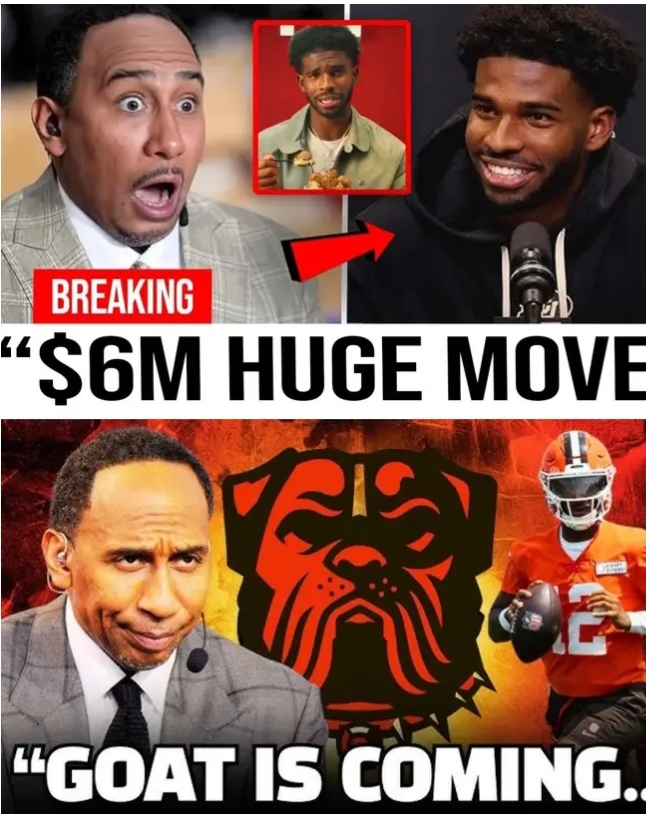CELEBRITY
He built a multi-million dollar empire before his first NFL game, launching a $250M merchandise line that sold out in a flash. He’s not just a player; he’s a business the NFL can’t control. This is the untold story of how Shedeur Sanders flipped the script.

In the world of professional sports, the path to stardom has long been a well-trodden one. A young athlete excels in college, gets drafted into the pros, and then, if they’re lucky and talented enough, they build a brand and a fortune under the watchful eye of their league. But what happens when a player flips the script? What happens when a rookie arrives not as a hopeful prospect, but as a self-made millionaire with a brand that rivals the league itself? This is the story of Shadur Sanders, the college football phenom who has single-handedly dismantled the traditional NFL rookie model and ushered in a new era of athlete empowerment.
Before even taking a single snap in the National Football League, Shadur Sanders has amassed a fortune that most veterans can only dream of. Through a series of savvy Name, Image, and Likeness (NIL) deals, Sanders has built a multi-million dollar empire, proving that the power in professional sports is no longer solely in the hands of the leagues and the teams. His journey is not just a testament to his talent on the field, but to his business acumen and his profound understanding of the modern media landscape. This is not just another story of a talented athlete; it is a story of a visionary who is reshaping the future of sports.
At the heart of Sanders’ success is a strategy that prioritizes ownership and long-term equity over quick endorsement checks. While many of his peers were content to sign lucrative deals with established brands, Sanders and his team were playing a different game. They sought out partnerships that offered him a piece of the pie, a stake in the companies he was promoting. This ownership-focused approach is a game-changer. It means that Sanders’ financial success is not solely tied to his performance on the field. It is a sustainable model that will continue to generate wealth long after his playing days are over. This is a level of financial foresight that is rarely seen in young athletes, and it is a clear indication that Sanders is not just thinking about the next game, but about the next generation.
But Sanders’ disruption of the NFL’s power dynamics goes beyond his financial dealings. He has also taken control of his own narrative, building a media machine that allows him to communicate directly with his millions of fans. In an age where athletes’ careers can be made or broken by the media, Sanders has become his own media mogul. With a dedicated team of photographers, videographers, and editors, he has curated a personal brand that is authentic, engaging, and incredibly powerful. He doesn’t need the traditional sports media to tell his story because he is telling it himself, on his own terms. This direct line of communication with his fanbase has allowed him to build a level of loyalty and engagement that is unprecedented. His fans are not just followers; they are a community, a movement that is invested in his success.
This loyal following has been the driving force behind the incredible success of his merchandise line. When Sanders launched his own line of apparel, it wasn’t just another athlete putting their name on a t-shirt. It was a cultural event. His fans flocked to buy his products, not just because they admired his skills on the field, but because they bought into his message of self-determination and individuality. They were not just buying a piece of clothing; they were buying a piece of the Shadur Sanders brand. This is the power of a “performance-proof” business model. While his on-field success will undoubtedly amplify his brand, his revenue streams are not solely dependent on it. He has built a business that is insulated from the volatility of a sports career, a business that is built to last.
The “Shadur Sanders effect” is sending shockwaves through the NFL. The league is accustomed to being the star-maker, the ultimate platform for athletes to build their brands. But Sanders has arrived as a pre-packaged superstar, with a loyal audience and a multi-million dollar business already in place. This shifts the power dynamic in a fundamental way. The NFL is no longer in a position of absolute control. They are now in a position where they must collaborate with and cater to a new breed of athlete, an athlete who is a brand in their own right. This presents a significant challenge for the league. How do they adapt to a world where rookies are no longer just rookies, but business partners? How do they integrate these powerful new players into a system that was built on a foundation of control?
The answers to these questions will shape the future of the NFL and professional sports as a whole. Shadur Sanders has provided a blueprint for a new generation of athletes, a roadmap for how to build an empire before ever stepping onto a professional field. He has shown them that they don’t have to wait for a league to make them a star; they can become a star on their own terms. This is a message that will resonate with young athletes around the world, and it is a message that will undoubtedly lead to a future where the NFL is populated by a new class of entrepreneur-athletes.
The story of Shadur Sanders is more than just a sports story; it is a story about the changing nature of power, media, and business. It is a story that is still being written, and the next chapter promises to be even more exciting than the last. As Sanders prepares to take the field for his first NFL game, he does so not just as a talented quarterback, but as a cultural icon, a business mogul, and a symbol of a new era in professional sports. The league may not be ready for him, but he is more than ready for the league. The game has changed, and Shadur Sanders is leading the charge.












